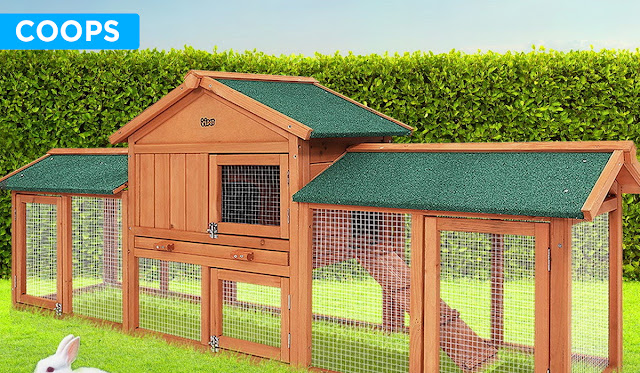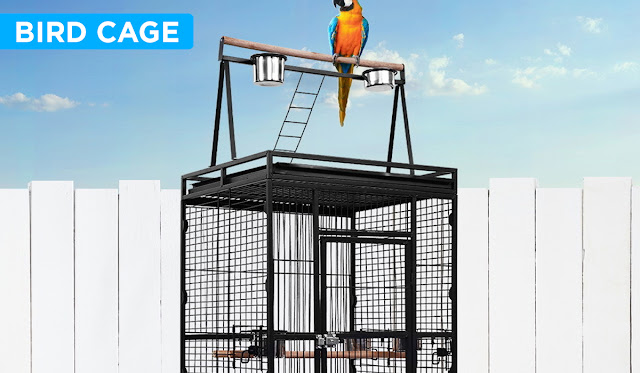A rabbit Coops Hutches and Cages should be at least 6 feet long and 2 feet broad. Your rabbit should be able to hop across the length of his cage a few times. It must also be tall enough for him to stand on his rear feet without hitting his head. Thus it must be at least 2 feet tall. If you're keeping numerous rabbits in the same cage, make it as spacious as possible to allow them enough room.
There should be an enclosed place with sturdy walls where they may "hide." Your rabbit will feel entirely exposed if the Coops Hutches and Cages are all wire with no private place, especially when it's dark. Rabbits dwell in subterranean burrows in the wild. They will be agitated and have a hard time sleeping if they do not have their secure zone. It will also serve as a shelter for them during inclement weather. Make the confined room warm and inviting by adding thick hay or straw to sleep in, as well as old blankets or a cat bed.
Install dual locks on all of the Coops Hutches and Cages' doors. Raccoons, for example, have dexterous small hands and can open essential locks. They won't be able to get in since there are two distinct types of locks. Each night at nightfall, you must go outside and lock the rabbits in their Coops Hutches and Cages. In the morning, you can open them up. They'll grow accustomed to it soon; my rabbits know when it's getting dark, and it's time to go into the Coops Hutches and Cages, so all I have to do now is close them up.
Place the Coops Hutches and Cages away from the sun. Rabbits are significantly more resistant to cold than they are to heat. Rabbits can suffer from heat discomfort and potentially die from heatstroke if the temperature rises over 85 degrees. It's critical to provide them with areas to relax in the shade. Install a shade sail or canopy over their play area, or plant some plants or trees nearby.
Chicken coops and cages
Chicken coops and cages are essentially housing for hens kept in a domestic setting, providing shelter and safety. Chicken coops are critical for the egg-laying process as well as the birds' overall health. Hens can grow their eggs appropriately in a safe and cozy coop. Temperature is essential for egg maturation and has a substantial impact on the protein content of the eggs.
Choose the ideal spot for the chickens. Small plots, spacious backyards, and vast fields are ideal locations for chicken coops and cages. After determining the optimum site for the birds, collect exact measurements. Providing access to a covered coop during the day is critical. If you have a tiny area, an integrated chook pen is the ideal option.
Determine the number of hens to be used. The quantity of room required to house the chickens must be determined. Some people begin by raising a small number of chickens but later opt to expand their flock. Choosing the exact number of birds early on can save money in the long run since there will be no need to buy new coops to accommodate additional bird purchases or future flock development.
Make a financial plan. When choosing a chicken cage, having a budget to work with allows for better decision-making. Having a budget may help you narrow down your options, and sticking to the budget can help you avoid overpaying.
When it comes to maintaining chickens, size does matter. Essentially, the animals want sufficient space to be comfortable and to play, scratch, and perch. Above all, coops and cages must be well-protected against the weather and keep hens secure from predators. The number of chickens to be maintained or reared determines the size of the coop in general. While a large coop is preferred, each bird should have at least 4 square feet of area.
Bird Cage
As a result, we've put together this guide to assist you in selecting a new cage. So, what factors must be considered while choosing a birdcage? Let's take a look at each one individually.
The internal living area of a bird is one of the most significant considerations for every bird keeper. The reason for this is that a small cage for sale may have an impact on your bird's general health. Birds, by nature, prefer to expand their wings and flap them. It may be challenging for them to do so if you have Cages for sale in a confined space. When a bird feels trapped, it may acquire a negative attitude, which you don't want. As a result, we strongly advise you to get a proper-sized birdcage straight away.
Another consideration for every bird keeper is the cage's design or appearance. Everyone wants to acquire something of high quality that also looks well for the flock. It is also advised that you think about the colors of the cages for sale and the bird. If you have the option, choose a cage that matches the colour of your bird. If you select anything that is the same color as your cage, it will be difficult to see your bird inside.
Above all, bar spacing is the most crucial aspect to consider when purchasing a birdcage. Keep in mind that there is a maximum even if there isn't a minimum bar spacing width. If it's too big, your bird will be able to fly away and injure itself. So, how do you determine if the distance between the bars is adequate for your birds?
If you have little birds like canaries, parakeets, finches, lovebirds, parrots, budgies, or cockatiels, bar spacing should be between 1/2" and 5/8". The suggested bar spacing for a cage for sale for medium-sized birds, including Quakers, lories, Pionus, senegals, tiny macaws, smaller amazons, smaller African greys, and cockatoos, is 1/2" to 3/4".Lastly, for larger bird species, such as condos, Hyacinth macaws, toucans, and African Greys, the suggested bar spacing is ¾" to 1".
Buy your pet products now and pay later with afterpay. HR Sports has a wide variety for your coops hutches and cages. Buy now!





.jpg)





.jpg)

.jpg)

.jpg)



0 Comments